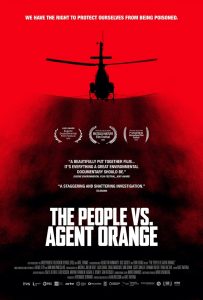 The Oregon Chapter of the Sierra Club will host a screening of The People vs. Agent Orange on Sunday, June 15 at 4 pm at the Darkside Cinema in Corvallis. This investigative documentary interweaves personal with political struggles as it follows two women who are leading a worldwide movement to hold manufacturers of these herbicides accountable.
The Oregon Chapter of the Sierra Club will host a screening of The People vs. Agent Orange on Sunday, June 15 at 4 pm at the Darkside Cinema in Corvallis. This investigative documentary interweaves personal with political struggles as it follows two women who are leading a worldwide movement to hold manufacturers of these herbicides accountable.
In France, Tran To Nga (Trahn-Toe-Nyah) sues the American chemical industry for poisoning her in Vietnam.
In the U.S., Carol Van Strum exposes the continuing use of toxic herbicides, many still containing dioxin. Incriminating documents disappear. Activists are threatened. A helicopter technician secretly films the contamination of reservoirs. The massive industrial cover-up continues.
The film won the 2021 Jury Award at the Eugene Environmental Film Festival.
The Agent Orange catastrophe did not end with the Vietnam War.
Today, the world over, a primary chemical of the toxic defoliant (dioxin) controls weeds in farming, forestry, parks, and playgrounds. It wreaks havoc on the human genome, causing birth deformities and deadly cancers.
Agent Orange was a 50:50 mix of two herbicides: 2,4,5-T, which was found to be highly contaminated with dioxin because of the high temperatures at which it was produced, and 2,4-D, which contains other forms of dioxin as well. Between 1961 and 1971, the U.S. sprayed 12 million gallons of contaminated Agent Orange and 8 million gallons of other herbicides on Vietnam, Laos, and Cambodia – an average of 5,200 gallons a day for 3,735 days. Over 7,813 square miles of upland and mangrove forests and 781 square miles of crops (an area rough the size of New Hampshire) were destroyed. In total, more than 66,000 square miles of South Vietnam were impacted, along with large areas of Laos and parts of Cambodia.
The People vs Agent Orange was directed and produced by Alan Adelson and Kate Taverna. “We hope that the film will make denial impossible and will stir action for reparations,” shared Alan, the Director. “To our surprise, as we were finishing the edit, we repeatedly encountered contemporary news that is integrally related to our film. Agent Orange is as relevant now as it was during the Vietnam war years.”
“Contemporary news” abounds in Oregon as pesticide sprays often have devastating consequences on local wildlife and the surrounding environment. If swaths of land are sprayed with pesticides via backpack sprayers and drones, other edible food sources, like salmonberries and mushrooms, can also become contaminated.
In 2024, 381 aerial spray operations were completed in Oregon forest lands, which translates to ~610,000 acres. Even when sprayed in specific areas, pesticides can spread broadly by drift, revolatilization (turning back into a vapor when warmed by the sun), and by getting into nearby streams and waterways, especially after it rains (which it tends to do in Oregon). Pesticides used in forestry management practices were found in 38% of bivalve sampled along the Oregon coast and have been linked to behavioral abnormalities in salmon (e.g., swimming performance, seaward migration, adult returns), compromised immune systems, and endocrine disruption.
A 2008 report from the Oregon Department of Agriculture concluded that 3,098,503 pounds of pesticides were applied in the southern Oregon coastal region in one year, and glyphosate followed by 2,4-D were the most commonly applied pesticides. Lobbyists work on behalf of chemical and timber companies and have persuaded legislators to pass laws shielding them from liability for poisoning Oregon residents and limiting any local restrictions on spraying. For example, a key point from the Right to Farm statute states, “Persons who locate on or near an area zoned for farm or forest use must accept the conditions commonly associated with living in that particular setting.”
This Sunday’s Showing
Following the film, Carol Van Strum, one of the two activists starring in the film, will be on hand to answer questions along with leaders from the Coast Range Association and Northwest Center for Alternatives to Pesticides.
All seats are $5.00. To get advance tickets and reserve a seat, patrons can visit https://darksidecinema.com
Do you have a story for The Advocate? Email editor@corvallisadvocate.com

